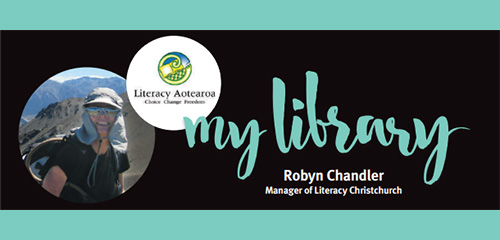Literacy Christchurch (formerly known as ARAS - Adult Reading Assistance Scheme) celebrates its 40th birthday today. ARAS began on 13 December 1977 as a pilot scheme initiated by the Canterbury WEA (Workers Educational Association), with 8 volunteer tutors and 8 students.
Robyn Chandler, manager of Literacy Christchurch, talked to Jan Orme, Senior Library Assistant, Outreach and Learning Team for the sixth issue of our magazine uncover - huraina.

Professionally, what does the library mean to you?
So many things – university, education, nurturing, empowerment, research, choice, access to knowledge – the library is a place of instruction and delight, and such a key feature of a free society. It’s a world of information and cultural richness rather than a set of walls. Libraries have provided both education and entertainment for me.
And personally – what’s your favourite part of the library?
Do I have to pick only one? I love the displays of artwork and artefacts, the children’s section and its sense of potential. I tend to focus on one area of a collection for a while – mountaineering, gardening, local history, music, art… recently the graphic novel collection (loved Northern Lights). But if I had to focus on just the one area because I had a time limit it would be the new books – there’s always something to find.
Would you please share some highlights of your own literacy journey?
I remember sitting outside the University library on a bleak winter’s day reading the 19th century novel Wuthering Heights, the words collapsing the distances of history, space, and culture. I was there, on that “bleak hill-top,” lost in the “atmospheric tumult.”
On a professional level, it would have to be becoming a volunteer literacy tutor and having the privilege of meeting people from all walks of life and sharing their literacy journey for a time.
What would you say to your learners who are new to using the library?
I would want them to know that they are in charge of their library experience and that there are people available to support them with their library choices and needs. I would advise them to not be intimidated and to be aware of the resources available to them and that library staff are more than happy to help. The library is there for everybody; the library belongs to us all.
We’d love to see more of your learners in our libraries, what would be your best advice to help us achieve that?
The most important thing new library users need to see is a friendly face and to feel welcomed, to see proof that the library is there for them and their community. Some of our learners have English as an additional language and it would be nice to see more welcome signs in other languages. I’m really pleased to see that families are going to be able to take part in the Summer Reading challenges this year, this kind of activity encourages novice library users to participate in what’s going on in the library. Doing things with whānau can feel more natural than doing things alone.
What would be the one book you would take to a desert island?
I’m going to cheat – my desert island will have WiFi and I will be accessing the library’s great and growing collection of eResources. Me, my device, and more media than I’ll ever be able to get through … a whole world at my fingertips.



Add a comment to: My Library – Robyn Chandler, Manager of Literacy Christchurch